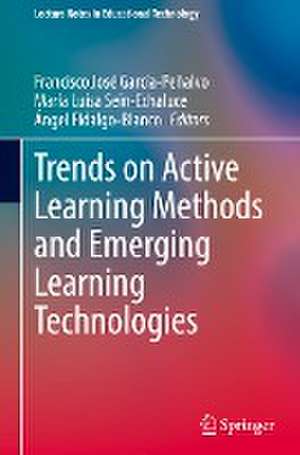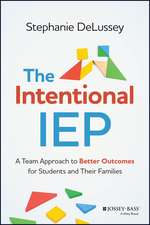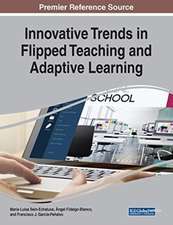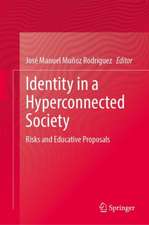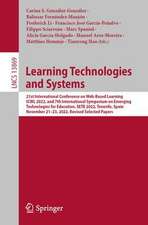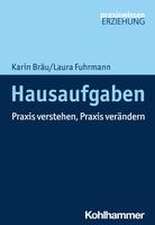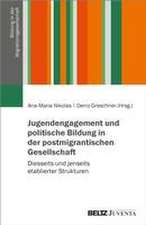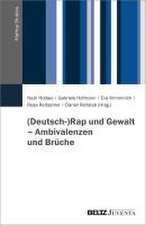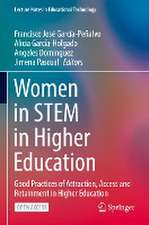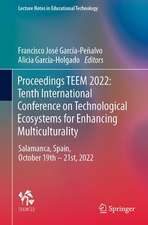Trends on Active Learning Methods and Emerging Learning Technologies: Lecture Notes in Educational Technology
Editat de Francisco José García-Peñalvo, María Luisa Sein-Echaluce, Ángel Fidalgo-Blancoen Limba Engleză Hardback – 2 dec 2022
| Toate formatele și edițiile | Preț | Express |
|---|---|---|
| Paperback (1) | 417.52 lei 6-8 săpt. | |
| Springer Nature Singapore – 3 dec 2023 | 417.52 lei 6-8 săpt. | |
| Hardback (1) | 424.81 lei 6-8 săpt. | |
| Springer Nature Singapore – 2 dec 2022 | 424.81 lei 6-8 săpt. |
Din seria Lecture Notes in Educational Technology
-
 Preț: 349.91 lei
Preț: 349.91 lei -
 Preț: 359.75 lei
Preț: 359.75 lei -
 Preț: 397.97 lei
Preț: 397.97 lei - 18%
 Preț: 898.43 lei
Preț: 898.43 lei - 20%
 Preț: 1006.05 lei
Preț: 1006.05 lei - 20%
 Preț: 820.58 lei
Preț: 820.58 lei - 15%
 Preț: 647.27 lei
Preț: 647.27 lei - 15%
 Preț: 699.45 lei
Preț: 699.45 lei - 15%
 Preț: 633.31 lei
Preț: 633.31 lei - 18%
 Preț: 945.62 lei
Preț: 945.62 lei - 20%
 Preț: 597.44 lei
Preț: 597.44 lei - 20%
 Preț: 580.52 lei
Preț: 580.52 lei - 15%
 Preț: 702.16 lei
Preț: 702.16 lei - 15%
 Preț: 644.82 lei
Preț: 644.82 lei - 15%
 Preț: 650.69 lei
Preț: 650.69 lei - 24%
 Preț: 804.32 lei
Preț: 804.32 lei - 18%
 Preț: 1003.38 lei
Preț: 1003.38 lei - 15%
 Preț: 647.08 lei
Preț: 647.08 lei - 18%
 Preț: 947.85 lei
Preț: 947.85 lei - 15%
 Preț: 643.48 lei
Preț: 643.48 lei - 18%
 Preț: 999.45 lei
Preț: 999.45 lei - 18%
 Preț: 1102.03 lei
Preț: 1102.03 lei - 18%
 Preț: 891.80 lei
Preț: 891.80 lei - 18%
 Preț: 1002.94 lei
Preț: 1002.94 lei -
 Preț: 393.90 lei
Preț: 393.90 lei - 18%
 Preț: 790.77 lei
Preț: 790.77 lei - 18%
 Preț: 946.41 lei
Preț: 946.41 lei - 18%
 Preț: 784.92 lei
Preț: 784.92 lei - 15%
 Preț: 643.99 lei
Preț: 643.99 lei - 15%
 Preț: 643.00 lei
Preț: 643.00 lei - 15%
 Preț: 644.63 lei
Preț: 644.63 lei - 24%
 Preț: 818.22 lei
Preț: 818.22 lei - 18%
 Preț: 902.36 lei
Preț: 902.36 lei - 18%
 Preț: 952.72 lei
Preț: 952.72 lei - 18%
 Preț: 942.44 lei
Preț: 942.44 lei -
 Preț: 387.96 lei
Preț: 387.96 lei - 18%
 Preț: 1001.50 lei
Preț: 1001.50 lei - 15%
 Preț: 647.59 lei
Preț: 647.59 lei - 15%
 Preț: 642.83 lei
Preț: 642.83 lei
Preț: 424.81 lei
Nou
Puncte Express: 637
Preț estimativ în valută:
81.31€ • 83.79$ • 68.64£
81.31€ • 83.79$ • 68.64£
Carte tipărită la comandă
Livrare economică 03-17 martie
Preluare comenzi: 021 569.72.76
Specificații
ISBN-13: 9789811974304
ISBN-10: 9811974306
Pagini: 217
Ilustrații: VIII, 217 p. 57 illus., 49 illus. in color.
Dimensiuni: 155 x 235 mm
Greutate: 0.5 kg
Ediția:1st ed. 2022
Editura: Springer Nature Singapore
Colecția Springer
Seria Lecture Notes in Educational Technology
Locul publicării:Singapore, Singapore
ISBN-10: 9811974306
Pagini: 217
Ilustrații: VIII, 217 p. 57 illus., 49 illus. in color.
Dimensiuni: 155 x 235 mm
Greutate: 0.5 kg
Ediția:1st ed. 2022
Editura: Springer Nature Singapore
Colecția Springer
Seria Lecture Notes in Educational Technology
Locul publicării:Singapore, Singapore
Cuprins
Improving the motivation of first-year undergraduate students through transversal activities and teamwork.- Conceptualizing a teacher training for identifying STEAM-Lab spaces to address diversity gaps.- Mentoring high ability university students: an experience with Computer Science undergraduates.- Challenge-based learning: Inter-University implementation in Animal Breeding.- The use of new technologies applied to the project-based learning method in an international context: VII Virtual Intensive Programme on the Future of Banking and Finance.- Historical Architectural Heritage as a Generator of Real Immersive Educational Environments for Project-Based Learning.- Evaluating the adaptation of a secondary teacher training programme: A case in the time of pandemic.- Error-controlled exercise training and its impact on learning.- Programme for the prevention of musculoskeletal and psychosocial disorders in professional training.- Teaching Physics to first-year university students with the flipped classroom.- Global indicators for measuring the learning of the active students.
Notă biografică
Francisco José García-Peñalvo is a Professor in the Department of Computer Science and Automation at the University of Salamanca (USAL), Spain, with four six-year periods of research, one six-year period of transferring and innovation, and four five-year periods of recognized teaching. He received the Beatriz Galindo award for teaching excellence in 2019. Since 2006, he has been the head of the Research Group Recognized by the USAL GRIAL (The research GRoup of InterAction and e-Learning). He was Vice-Dean of Innovation and New Technologies of the Faculty of Sciences of the USAL between 2004 and 2007, and Vice-Rector of Technological Innovation between 2007 and 2009. He is currently the Rector's Delegate for Virtual Teaching, and the Coordinator of the Doctorate Programme in Education in the Knowledge Society at USAL. He has published more than 100 research papers in JCR (Journal Citation Reports)-indexed journals.
María Luisa Sein-Echaluce, Ph.D. in Mathematics, is Associate Professor of Applied Mathematics at the School of Engineering and Architecture at the University of Zaragoza, Spain, with three six-year periods of research and five five-year periods of recognized teaching. She was Director of the Virtual Campus of the University of Zaragoza from 2012 to 2020. She is President of the Scientific Committee and Secretary of the Organization Committee in the International Conference on Learning, Innovation and Cooperation since 2011. She has a long experience in the evaluation of educational research and innovation projects in several Spanish universities, as well as the organization and implementation of permanent training courses on educational innovation and technologies. She has been Associate Editor of special issues of international research journals such as Computers in Human Behavior and European Journal of Engineering Education. She is also Member of numerous scientific committees in international journals and conferences and Author of research papers in JCR-indexed journals.
Ángel Fidalgo-Blanco, Ph.D. in Computer Science and Artificial Intelligence, is Associate Professor and Director of the Laboratory for Innovation in Information Technologies at the Technical University of Madrid, Spain, with two six-year period of research, one six-year period of transferring and innovation and six five-year periods of recognized teaching. He was Deputy Director of the Applied Mathematics and Computer Methods Department from 1999 to 2014. He was awarded 'Best OCW Subject Award' by the Ministry of Education of the Spanish Government, 'Educational Innovation Award' and 'Teaching Excellence,' both by the Technical University of Madrid. He is currently President of the Organizing Committee for the International Conference of Learning, Innovation and Cooperation. He has been Associate Editor of special issues of international research journals. He is also Member of numerous scientificcommittees in international journals and conferences and Author of research papers in JCR-indexed journals.
Ángel Fidalgo-Blanco, Ph.D. in Computer Science and Artificial Intelligence, is Associate Professor and Director of the Laboratory for Innovation in Information Technologies at the Technical University of Madrid, Spain, with two six-year period of research, one six-year period of transferring and innovation and six five-year periods of recognized teaching. He was Deputy Director of the Applied Mathematics and Computer Methods Department from 1999 to 2014. He was awarded 'Best OCW Subject Award' by the Ministry of Education of the Spanish Government, 'Educational Innovation Award' and 'Teaching Excellence,' both by the Technical University of Madrid. He is currently President of the Organizing Committee for the International Conference of Learning, Innovation and Cooperation. He has been Associate Editor of special issues of international research journals. He is also Member of numerous scientificcommittees in international journals and conferences and Author of research papers in JCR-indexed journals.
Textul de pe ultima copertă
This book uncovers the crucial issues in learning technologies in this digital transformation moment, specifically within the COVID-19 umbrella effects. Remote learning, educational technologies, or distance learning are usually used topics by teachers, students, and researchers because the educational context should be transformed and even reinvented itself drastically. Technologies have been used more intensively in the last year than during the last decade. However, what is the effect of these "new" technologies on the teaching and learning methodologies? Are teachers and students fully digital competent to integrate these technologies in their teaching and learning activities? In this book, the authors claim to go forward that the online teaching conception to replicate the face-to-face teaching through a camera. They propose adapting the active methodologies to the online or hybrid context, which is a challenge that must be corroborated with rigorous educational research.
Caracteristici
Contains numerous examples of mechanisms and strategies to improve and promote educational innovation Includes good practices and initiatives written by teachers of any educational-level worldwide Promotes active learning methods
